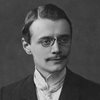Subtotal: $
Checkout
Life in Community Means Life in the Spirit
By Eberhard Arnold
March 11, 2014
Available languages: Deutsch
We acknowledge Jesus and early Christianity. The early Christians dedicated themselves as much to people’s outward needs as to their inner ones. Jesus brought life: he healed sick bodies, resurrected the dead, drove out demons from tormented souls, and carried his message of joy to the poorest of the poor. Jesus’ message means the realization of the future invisible kingdom now; it is the promise that ultimately the earth will be won wholly for God.
It is the whole that matters here. Just as the love of God does not acknowledge any boundary or stop at any barrier, Jesus does not stop in the face of property any more than he does in the face of theology, moralism, or the state. Jesus saw into the heart of the rich young man, whom he loved, and said, “One thing you lack: sell all you have, give it to the poor, and come with me!” It was a matter of course for Jesus that his disciples should hold no personal possessions but rather keep a common purse. Only one man was entrusted with the hateful responsibility of managing the disciples’ money, and he broke under it – a lesson with no little significance for our mammonistic society today.
Yet even Christ’s betrayal and execution did not mean defeat. The enthusiastic experience of the Spirit with which the Risen One endowed his itinerant disciples gave them the power to carry on their communal life on a larger scale. The first church became a community of several thousand people who, because love was burning in them, had to stay together. In all questions regarding communal life, the forms that emerged were in keeping with an understanding of life as one unified whole.
The first Christians in Jerusalem held everything in common. Whoever owned property felt compelled from within to share it. No one had anything that did not belong to the church. Yet what the church owned was there for all. Its generous love excluded no one, and an open door and an open heart were therefore among its characteristics. At the time of its flowering it found ways to reach all people. And though its members were bound to become the target of hatred and hostility, they still won the love and trust of those around them. It was inevitable that they should, for they were there heart and soul for everyone.
The early Christians lived in the Spirit. The Spirit blows like the wind – it is never rigid like iron or stone. The Spirit is infinitely more sensitive and delicate than the inflexible designs of the intellect or the cold, hard framework of governmental or societal structures. The Spirit is more sensitive even than all the emotions of the human soul, more sensitive than all the powers of the human heart, on which people so often try – in vain – to build lasting edifices. But just for this reason the Spirit is stronger and more irresistible than all these things, never to be overcome by any power, however terrible; for it is the breadth, depth, and height of being.
In Jesus, who lived a life of love without violence, love without rights, and love without the desire to possess, the Spirit lives on powerfully as the Risen One, as the inner voice and the inner eye that leads to community.
The light of the early church illuminated the path of humankind in only one short flash. Yet its spirit and witness stayed alive even after its members had been scattered and many of them murdered. Again and again through history, similar forms arose as gifts of God, expressions of the same living Spirit. Witnesses were killed, and fathers died, but new children were – and are – born to the Spirit again and again. Communities pass away. But the church that creates them remains.
Efforts to organize community artificially can only result in ugly, lifeless caricatures. Only when we are empty and open to the Living One – to the Spirit – can he bring about the same life among us as he did among the early Christians. The Spirit is joy in the Living One, joy in God as the only real life; it is joy in all people, because they have life from God. The Spirit drives us to all people and brings us joy in living and working for one another, for it is the spirit of creativity and love.
Community life is possible only in this all-embracing Spirit and in those things it brings with it: a deepened spirituality and the ability to experience life more keenly and intensely. Surrendering to this Spirit is such a powerful experience that we can never feel equal to it. In truth, the Spirit alone is equal to itself. It quickens our energies by firing the inmost core – the soul of the community – to white heat. When this core burns and blazes to the point of sacrifice, it radiates far and wide.
Community life is like martyrdom by fire: it means the daily sacrifice of all our strength and all our rights, all the claims we commonly make on life and assume to be justified. In the symbol of fire the individual logs burn away so that, united, its glowing flames send out warmth and light again and again into the land.
We must live in community because the spirit of joy and love gives us such an urge to reach out to others that we wish to be united with them for all time.

Already a subscriber? Sign in
Try 3 months of unlimited access. Start your FREE TRIAL today. Cancel anytime.






